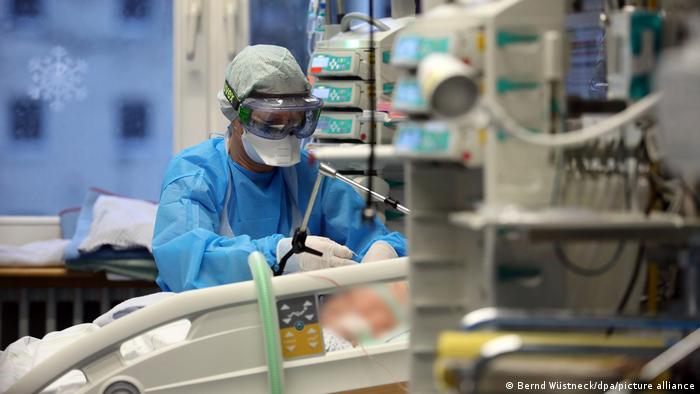Published
4 years agoon
By
Joe Pee
Intensive care doctors say some measures should be put back in place to avoid another resurgence
The number of coronavirus cases in Germany grew 20% in the past week, as lockdown restrictions are gradually eased, an expert at the Robert Koch Institute for infectious diseases (RKI) said Tuesday.
The figures were released as the country’s intensive care doctors warn of the need for an “immediate return” to partial lockdown to stave off a dangerous third wave of coronavirus cases.
RKI epidemiologist Dirk Brockmann told German broadcaster ARD that the loosening of measures was particularly unhelpful given the exponential growth that has occurred with the British virus variant B117.
“We are exactly on the flank of the third wave. That can no longer be disputed. And, at this point, we have eased the restrictions and that is speeding up the exponential growth,” RKI epidemiologist Dirk Brockmann told German broadcaster ARD.
“It has been totally been irrational to loosen up here. It’s just fueling this exponential growth.”
German intensive care doctors on Monday warned that some measures should be put back in place to avoid another resurgence.
“From the data we currently have and with the spread of the British mutation, we would argue strongly to return immediately into a lockdown to avoid a strong third wave,” Christian Karagiannidis, director of Germany’s intensive care register, told broadcaster RBB.
The RKI on Tuesday reported 5,480 new cases over 24 hours, bringing the total to 2,581,329.
The number of deaths rose by 238, to 73,656.
Despite ongoing vaccination rollout delays, several countries have suspended use of AstraZeneca’s COVID vaccine over multiple reports of blood clotting issues developing in people after vaccination.
Germany, Italy and France became the latest countries to halt use of the vaccine on Monday as a precautionary measure.
Shops and stores are allowed to open for a limited number of customers, if the seven-day incidence is less than 50 per 100,000 people for a particular district.
Retailers can arrange appointments with a limited number of shoppers, if the incidence number is 100 or less.
Bookshops, flower shops and garden centers have reopened in most regions.
Museums and art galleries are allowed to open under certain conditions or by appointment. In some states, this will depend on the regional seven-day incidence.
Hairdressers and barbers have already been open since March 1. But from Monday, cosmetics, nail bars, massage or tattoo studios can also reopen under strict conditions.
When it comes to contact restrictions, in many places, people from one household can meet with another household in private. But the maximum number of people cannot exceed five adults plus children.
Up to 10 people can participate in non-contact outdoor sports if the incidence rate is below 50. A maximum of five people from two households can do sports outside up to a seven-day incidence rate of 100.
Children up to the age of 14 can play sports outside in groups of up to 20.
Germany’s federal government is now financing at least one free rapid coronavirus test per week for every citizen.


Dozens of children killed in crush at Nigerian Christmas funfair


President-elect Mahama Calls for Urgent Overhaul of Ghana’s Energy Sector Amid Economic Concerns


Ghana Secures $316 Million in FDI for First Three Quarters of 2024


CAF President Dr Motsepe begins two-day tour of CHAN 2025 Host Nations in Tanzania on Thursday


Electoral Commission Calls for Unity Amid Controversies Over Parliamentary Results


Parents Held Accountable as Teen Driver Sentenced in Fatal East Legon Accident


Suspect Arrested for Vandalism at Parliament


Supreme Court Upholds Legislative Autonomy in Human Sexual Rights Bill Case


Petition Targets Chief Justice Torkornoo Over Alleged Administrative Overreach

























